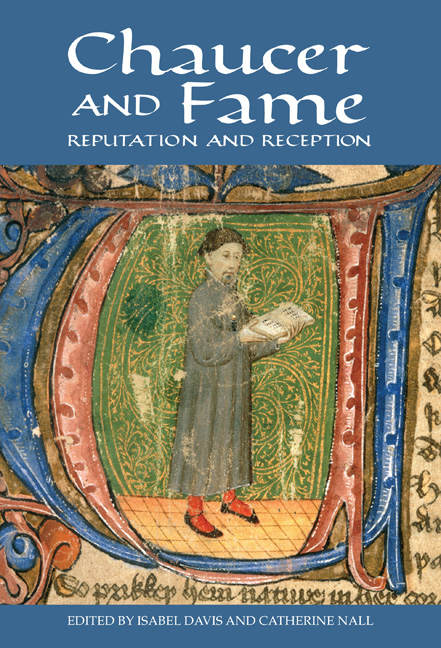Book contents
- Frontmatter
- Contents
- List of Illustrations
- List of Contributors
- Acknowledgements
- Introduction
- 1 Chaucer Joins the Schiera: The House of Fame, Italy and the Determination of Posterity
- 2 ‘I Wolde … han Hadde a Fame’: Dante, Fame and Infamy in Chaucer’s House of Fame
- 3 ‘And kis the Steppes where as thow Seest Pace’: Reconstructing the Spectral Canon in Statius and Chaucer
- 4 ‘I Nolde Sette at al that Noys a Grote’: Repudiating Infamy in Troilus and Criseyde and The House of Fame
- 5 The Early Reception of Chaucer’s The House of Fame
- 6 Fame’s Penitent: Deconstructive Chaucer Among the Lancastrians
- 7 After Deschamps: Chaucer’s French Fame
- 8 ‘Fresch Anamalit Termes’: The Contradictory Celebrity of Chaucer’s Aureation
- 9 Chaucer the Puritan
- 10 Revenant Chaucer: Early Modern Celebrity
- 11 Ancient Chaucer: Temporalities of Fame
- Bibliography
- Index
- Chaucer Studies
9 - Chaucer the Puritan
Published online by Cambridge University Press: 21 May 2021
- Frontmatter
- Contents
- List of Illustrations
- List of Contributors
- Acknowledgements
- Introduction
- 1 Chaucer Joins the Schiera: The House of Fame, Italy and the Determination of Posterity
- 2 ‘I Wolde … han Hadde a Fame’: Dante, Fame and Infamy in Chaucer’s House of Fame
- 3 ‘And kis the Steppes where as thow Seest Pace’: Reconstructing the Spectral Canon in Statius and Chaucer
- 4 ‘I Nolde Sette at al that Noys a Grote’: Repudiating Infamy in Troilus and Criseyde and The House of Fame
- 5 The Early Reception of Chaucer’s The House of Fame
- 6 Fame’s Penitent: Deconstructive Chaucer Among the Lancastrians
- 7 After Deschamps: Chaucer’s French Fame
- 8 ‘Fresch Anamalit Termes’: The Contradictory Celebrity of Chaucer’s Aureation
- 9 Chaucer the Puritan
- 10 Revenant Chaucer: Early Modern Celebrity
- 11 Ancient Chaucer: Temporalities of Fame
- Bibliography
- Index
- Chaucer Studies
Summary
Despite constructing a narrative of English ecclesiastical history which was saturated with authoritative citations of medieval writers – including Chaucer – John Milton wrote in 1641 that to look to the medieval past for spiritual examples had its risks: ‘Thus finally it appears that those purer Times were no such as they are cry’d up, and not to be follow’d without suspicion, doubt and danger.’ Milton's scepticism towards the putative spiritual and ecclesiastical purity of the medieval past can act as a kind of thumbnail sketch for the portrait of Chaucer's celebrity in the later sixteenth and seventeenth centuries drawn in this essay, for it combines scholarliness and scepticism with a strong, even compulsive, desire for national religious and literary parentage, even as it explicitly warns its reader of the precarious and contested ‘danger’ of pursuing Chaucer's ghost. While Milton's sceptical (or selectively sceptical) historiography makes another of his prose works, The History of Britain (1671), a useful touchstone for ideas about a developing ‘historical sense’ in the early modern period, it also serves both to entrench the reception of medieval literature within the discourse of religious controversy and to suggest the fraught and fractious nature of Chaucer's status and celebrity in the later sixteenth and seventeenth centuries.
In many ways, literary celebrity might be an area in which we see a strong divide between the cultures of pre-and post-Reformation England. Despite Chaucer's own, deeply equivocal, attitude towards fame – and, we might add, the self-consciously constrained or problematized view of ‘making’ held by a number of major late medieval poets – the sixteenth and seventeenth centuries made Chaucer their own. Moreover, the way in which literary culture worked in these centuries – coming after the aureate and laureate shifts in the poetics of the fifteenth and early sixteenth centuries – made literary fame a comparatively straightforward thing. The ‘Renaissance’ found literary celebrity, and self-appointed laureateship, a great deal simpler than Chaucer had done in The House of Fame. Indeed, in some ways to think about Chaucer's fame and celebrity in the sixteenth and seventeenth centuries is to recognize how widely and pervasively his name could be taken in vain.
A quick tour through a number of versions of the ‘Renaissance Chaucer’ is an entertaining and sometimes eccentric experience.
- Type
- Chapter
- Information
- Chaucer and FameReputation and Reception, pp. 165 - 184Publisher: Boydell & BrewerPrint publication year: 2015
- 2
- Cited by



